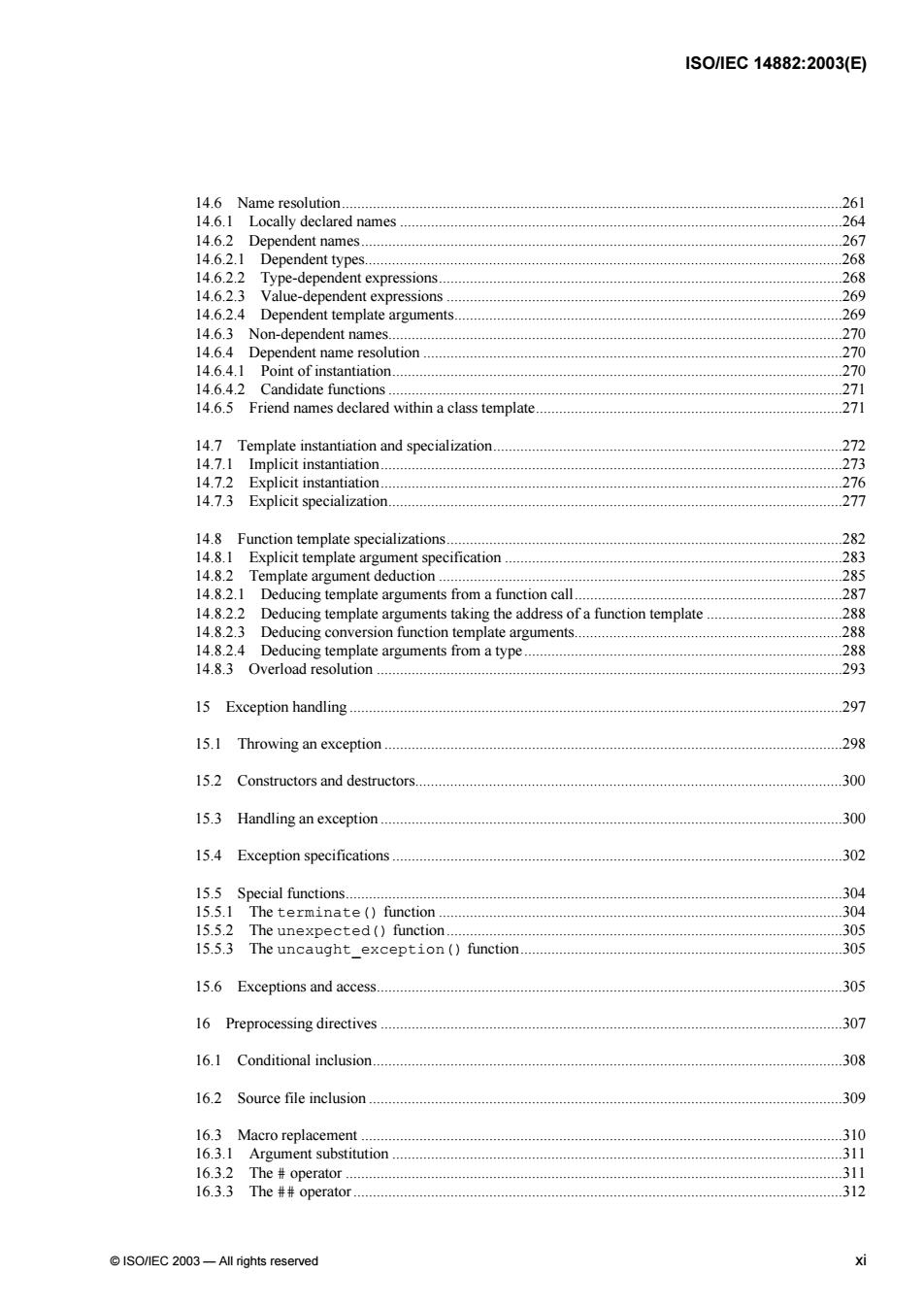正在加载图片...

IS01EC14882:2003(曰 14.6 Name resolution. 261 146.1 Locally declared names 264 14.6 2 Dependent names 267 1462.1 Dependert type 268 14622 Type-dependent expressions. 268 14623 Value-dependent expressions 269 14.62.4 Dependent template arguments......... 269 14.6 3 Non-dependent names 444270 14.6.4 Dependent name resolution......... 270 14 6 4 1 Point of instantiation. 270 14.6.42 Candidale functions 271 1465 Friend names declared within a class template 4271 14.7 Template instantiation and specialization. 272 14.7.1 Implicit instantiation. 273 14.72 Explicit instantiation. 14.73 Explicit specialization. 277 148 Function template specializatioes... 282 14 8.I Explicit template argument specification 14.82 Template argument deduction..... 4283 285 14.821 Deducing template arguments from a function call 287 14822 Deducing template arguments taking the address of a function template 288 14.823 Dedueing comversion function templae arguments 4444444444444444444444444 288 14.8 24 Deducing template arguments from a type. 288 1483 Overload resolution ,293 15 Exoeption handling 297 15.1 Throwing an exception 29% 15 2 Constructors and destructors.. 300 15.3 Handling an exception. 444300 154 Exception specifications. 302 155 Special functions. 304 15 5.1 The terninate (function......... 304 1552 The unexpected()function.... 30S 1553 The uncaught_exception (function. 305 156 Exceptions and access 305 16 Preprocessing directives 307 16.1 Conditional inclusion 308 162 Source file inclusion .309 16.3 Macro replacemert 30 16.3.1 Argument substitutiomn 311 1632 The operator 16.33 The operalor 312 。50EC2003-Mg修eserved ISO/IEC 14882:2003(E) © ISO/IEC 2003 — All rights reserved xi 14.6 Name resolution .................................................................................................................................261 14.6.1 Locally declared names ..................................................................................................................264 14.6.2 Dependent names ............................................................................................................................267 14.6.2.1 Dependent types...........................................................................................................................268 14.6.2.2 Type-dependent expressions ........................................................................................................268 14.6.2.3 Value-dependent expressions ......................................................................................................269 14.6.2.4 Dependent template arguments ....................................................................................................269 14.6.3 Non-dependent names.....................................................................................................................270 14.6.4 Dependent name resolution ............................................................................................................270 14.6.4.1 Point of instantiation ....................................................................................................................270 14.6.4.2 Candidate functions .....................................................................................................................271 14.6.5 Friend names declared within a class template ...............................................................................271 14.7 Template instantiation and specialization ..........................................................................................272 14.7.1 Implicit instantiation .......................................................................................................................273 14.7.2 Explicit instantiation .......................................................................................................................276 14.7.3 Explicit specialization .....................................................................................................................277 14.8 Function template specializations ......................................................................................................282 14.8.1 Explicit template argument specification .......................................................................................283 14.8.2 Template argument deduction ........................................................................................................285 14.8.2.1 Deducing template arguments from a function call .....................................................................287 14.8.2.2 Deducing template arguments taking the address of a function template ...................................288 14.8.2.3 Deducing conversion function template arguments.....................................................................288 14.8.2.4 Deducing template arguments from a type ..................................................................................288 14.8.3 Overload resolution ........................................................................................................................293 15 Exception handling ...............................................................................................................................297 15.1 Throwing an exception ......................................................................................................................298 15.2 Constructors and destructors..............................................................................................................300 15.3 Handling an exception .......................................................................................................................300 15.4 Exception specifications ....................................................................................................................302 15.5 Special functions ................................................................................................................................304 15.5.1 The terminate() function ........................................................................................................304 15.5.2 The unexpected() function ......................................................................................................305 15.5.3 The uncaught_exception() function ...................................................................................305 15.6 Exceptions and access ........................................................................................................................305 16 Preprocessing directives .......................................................................................................................307 16.1 Conditional inclusion .........................................................................................................................308 16.2 Source file inclusion ..........................................................................................................................309 16.3 Macro replacement ............................................................................................................................310 16.3.1 Argument substitution ....................................................................................................................311 16.3.2 The # operator ................................................................................................................................311 16.3.3 The ## operator ..............................................................................................................................312